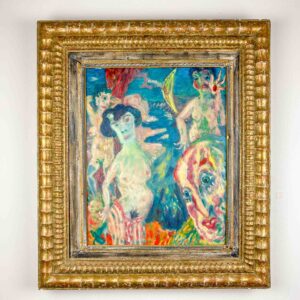Aad de Haas
Aad de Haas (Rotterdam 1920 – Schaesberg 1972) was a Dutch painter who gained fame for his expressive and often controversial works of art.
De Haas grew up in an artistic family. His father was an architect, and this early contact with art inspired the young Aad to follow his own creative path. After studying at the Academy of Fine Arts in Rotterdam, Aad de Haas began his artistic career in a figurative style. His early works show influences of expressionism and cubism, but it was only in the post-war period that his style evolved into a more contemporary and provocative form.
In the 1940s and 1950s, De Haas established himself as a promising artist, but his work became increasingly politically charged and controversial. He used his art as a means to expose social and political issues, often sharply criticising the establishment and the church. His paintings and drawings reflect his commitment to social justice and his aversion to injustice.
In 1949, Aad de Haas settled in the Limburg village of Elsloo, where he married his life partner Sophie. Together they had four children. During his time in Elsloo, De Haas developed a strong bond with the local community, but his controversial artworks also brought tensions. In particular, his depictions of religious figures and criticism of church institutions led to controversy and even threats.


